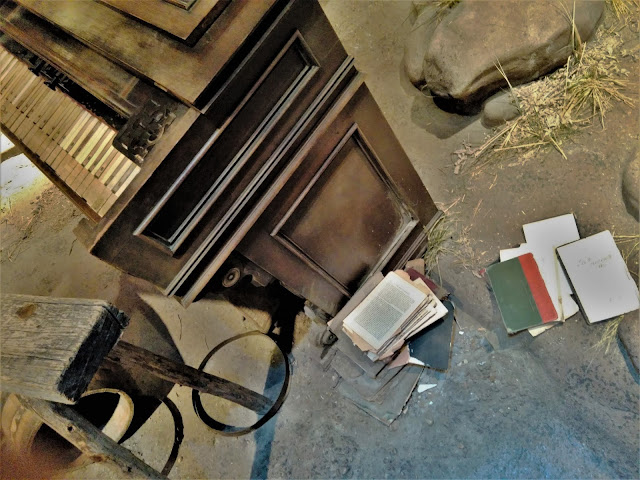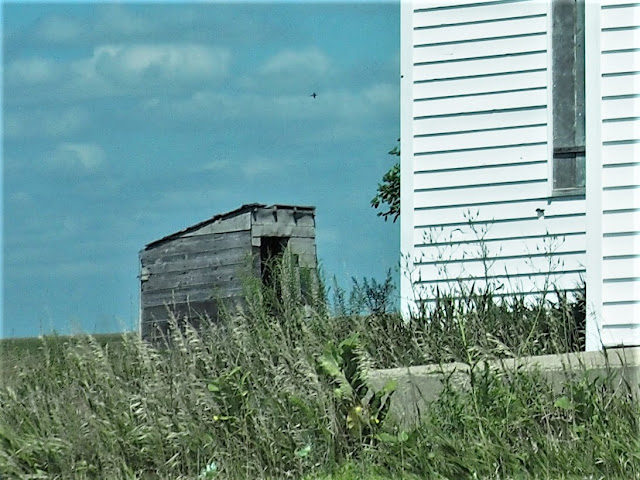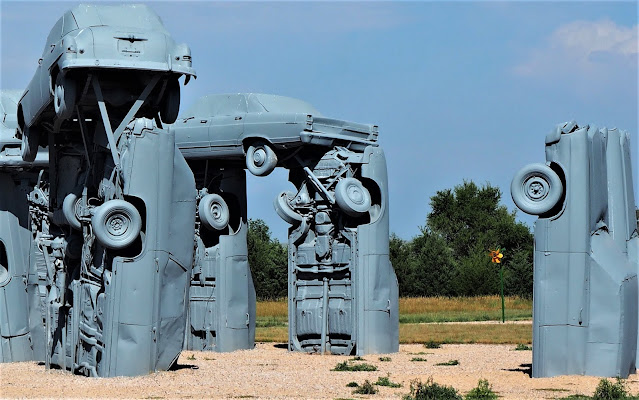"Before we begin, I'd just like to begin with a land acknowledgement," she said, "acknowledging the indigenous people who lived in this area."
Truth be told, there weren't all that many people around. I was a little disappointed in the size of the crowd--three or four dozen people, most of them, like me, decidedly on the far side of their forties. A pandemic is raging in this corner of the state, I told myself. Don't be critical. It was something of a risk being out at all, even if this dedication was occurring outside, on a downtown street of a small town.
I'm not Luxembourgian, but, strangely enough, I've been around Luxembourgian-American strongholds for most of my life, so they've always been on my radar screen. The official Luxembourgian-American museum is just down the road from my still heavily Dutch-American hometown of Oostburg, Wisconsin. The Luxembourgers of northwest Iowa came to this corner of the state--the only region at the time not yet homesteaded by Euro-Americans--in 1870, the same year the region's Dutch unloaded their wagons just a few miles away.
By 1880 or so, Alton, Iowa, like Remsen, just south, was greatly Roman Catholic. Orange City and Sioux Center were not, to say the least. Live embers of the 16th century Reformation were still generating heat in souls of both persuasions--as they may yet be today in the tightest corners of the nearby Dutch Calvinist world.
I'd come--we'd all come--to dedicate a mural, a big, beautiful colorful thing right across from the Veterans Memorial in downtown Alton. It's not particularly easy to get a mural in a camera, so forgive me for missing something of the far end, but this is it.
It's a glorious flutter of butterflies across a darkened prairie landscape. Some ghostly ancestral four-leggeds haunt the place--the buffalo are long gone, of course--and those magical little yellow bubbles, the artist told us, are--I should have thought of it--are fireflies. Let me bring something of it closer.
Iowa is outlined there between it's two mighty rivers--the Mississippi out east, and the Missouri out west. That light jet trail across the state, from Dubuque (a village called St. Donatus actually) to the Siouxland villages of Alton, Marcus, Remsen, Hospers, and LeMars, is the long trek the Siouxland Luxembourger pioneers put down to get here and claim some of Iowa's very best black dirt.
The creative genius, behind all of this, Prof. Amber Hansen, was there for the dedication. She teaches art at the University of South Dakota, but hails from Alton and stoutly claims her own Luxembourgian heritage, even visited "the old country" recently to see the land her ancestors left behind. She calls the mural "a community project," because it was, and is. See those butterfly wings--they're unfinished. She and her crew will fill them in eventually, she promised. Alton, she said, has a lot of good artists.
But the way she started the whole dedication was, to me, stunning, not so much because of what she said, but because she said it at all. "I'd like to begin with a land acknowledgement." I had no idea what a "land acknowledgement" was. Today, I know.
She said she took this "land acknowledgement" from the U. S. Department of Arts and Culture. This is what she read to begin the program, a dedication of her own big, colorful mural on the wall of a business in downtown Alton, Iowa.
Every community owes its existence and vitality to generations from around the world, who contributed their hopes, dreams, and energy to making the history that led to this moment. Some were brought here against their will, some were drawn in hopes of making a better life, and some have lived on this land for more generations than can be counted.
She was acknowledging that the land where her ancestors and mine settled was not so much their own as it was a land with a long history, a legacy that needed to be openly and publicly acknowledged. Human beings lived here and loved here before any of our great-grandparents made homestead claims.
Truth and acknowledgement are critical to building respect and connection across all barriers of heritage and difference. Today we are standing on the ancestral lands of many indigenous tribes, but most recently of . . .
. . .and here she named two tribal peoples whose names few in the crowd, if any, had ever heard of, even though many of us, I'm sure, live in Sioux County, in a state, Iowa, named after a tribal people who've been gone for far more than 150 years. I didn't know tribes she listed, nor certainly how to spell their names; and it isn't pleasant right now admitting as much.
We pay respect to their elders, past and present. Please take a moment to consider the many legacies of violence, displacement, migration and settlement that brings us together here today; and please join us in acknowledging these truths in any and all public events.
She was calling us to repentance, something both Catholics and Calvinists have understood for generations, for centuries.
Have a look again at Prof. Hanson's beautiful mural. Big, colorful butterflies wing their way through the scene, but behind them there are others, shadowy butterfly figures, ghosts of the past, reminders that what's here is only what's here now, not what once was.
I was perfectly stunned by the "land acknowledgement," stunned and gratified. It was a blessed reminder that this isn't our land at all. It happens to be where we live, but no one should think of it as being ours.
When Prof. Amber Hansen, the artist, read those words, she was teaching us the only really substantive genre of authentic "patriotic history."
This morning, I'm thankful for what she taught me on Sunday morning--and, well, us.































